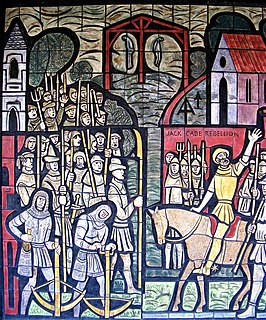A Quote by Jack Cade
They say that it were great reproof to the king to take again what he has given, so that they will not suffer him to have his own good, nor land, nor forfeiture, nor any other good but they ask it from him, or else they take bribes of others to get it for him.
Related Quotes
And what shall he suffer who slays him who of all men, as they say, is his own best friend? I mean the suicide, who deprives himself by violence of his appointed share of life. Not because the law of the state requires him. Nor yet under the compulsion of some painful and inevitable misfortune which has come upon him. Nor because he has had to suffer from irremediable and intolerable shame, but who from sloth or want of manliness imposes upon himself an unjust penalty.
Nothing can separate you from His love, absolutely nothing, neither death nor life, nor angels, nor principalities, nor powers, nor things present, nor things to come, nor height, nor depth, nor any other creature... We do not need to beg Him to bless us, He simply cannot help it. Therefore God is enough! God is enough for time, God is enough for eternity. God is enough!
Cry, the beloved country, for the unborn child that's the inheritor of our fear. Let him not love the earth too deeply. Let him not laugh too gladly when the water runs through his fingers, nor stand too silent when the setting sun makes red the veld with fire. Let him not be too moved when the birds of his land are singing. Nor give too much of his heart to a mountain or a valley. For fear will rob him if he gives too much.
At first, man was enslaved by the gods. But he broke their chains. Then he was enslaved by the kings. But he broke their chains. He was enslaved by his birth, by his kin, by his race. But he broke their chains. He declared to all his brothers that a man has rights which neither god nor king nor other men can take away from him, no matter what their number, for his is the right of man, and there is no right on earth above this right. And he stood on the threshold of freedom for which the blood of the centuries behind him had been spilled.
The essence of justice is mercy. Making a child suffer for wrong-doing is merciful to the child. There is no mercy in letting the child have its own will, plunging headlong to destruction with the bits in its mouth. There is no mercy to society nor to the criminal if the wrong is not repressed and the right vindicated. We injure the culprit who comes up to take his proper doom at the bar of justice, if we do not make him feel that he has done a wrong thing. We may deliver his body from the prison, but not at the expense of justice nor to his own injury.
There is a time in every man's education when he arrives at the conviction that envy is ignorance; that imitation is suicide; that he must take himself for better, for worse, as his portion; that though the wide universe is full of good, no kernel of nourishing corn can come to him but through his toil bestowed on that plot of ground which is given to him to till. The power which resides in him is new in nature, and none but he knows what that is which he can do, nor does he know until he has tried.
Pilate sentenced him due to fear, in accordance with the petition and intention of others. These people sentence him for their own advantage and without any fear, by dishonoring him through sin that they could abstain from, if they wanted. But they neither abstain from sin nor are they ashamed of their already committed sins, for they do not take into consideration their unworthiness of the kindness of the one whom they do not serve.
A prince must not have any objective nor any thought, nor take up any art, other than the art of war and its ordering and discipline; because it is the only art that pertains to him who commands. And it is of such virtue that not only does it maintain those who were born princes, but many times makes men rise to that rank from private station.
And for a disciple thus freed, in whose heart dwells peace, there is nothing to be added to what has been done, and naught more remains for him to do. Just as a rock of one solid mass remains unshaken by the wind, even so, neither forms, nor sounds, nor odors, nor tastes, nor contacts of any kind, neither the desired, nor the undesired, can cause such an one to waver. Steadfast is his mind, gained is deliverance.




































